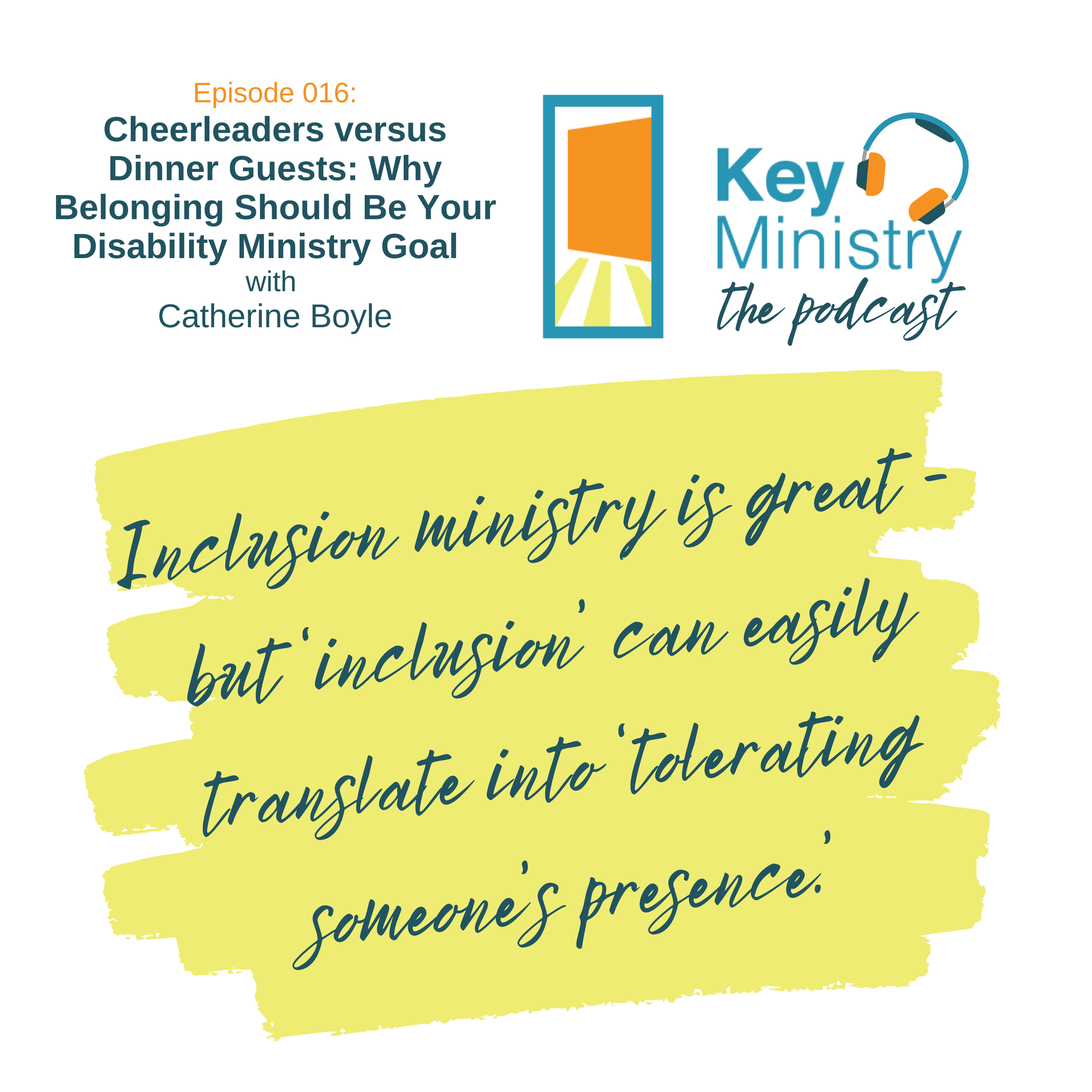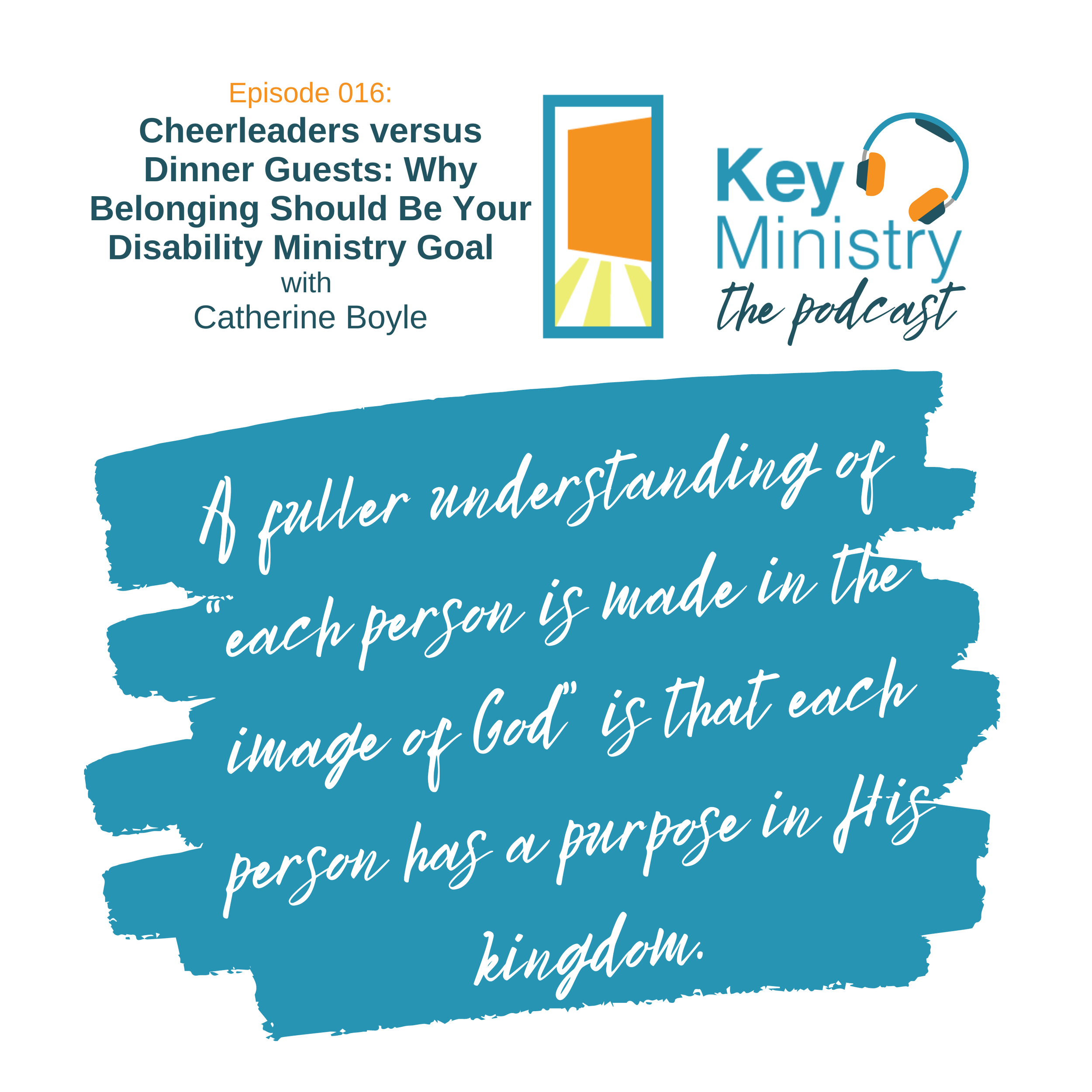In today’s episode, Catherine Boyle lets you in on some of her middle school angst and shares a principle to help your disability ministry focus on belonging.
Listen in your favorite podcast app!
Transcript:
Welcome to the Key Ministry podcast! I’m this week’s host, Catherine Boyle. In today’s episode, I’ll let you in on some of my middle school angst, and share a principle to help your disability ministry focus on belonging. Be sure to hit subscribe to this podcast, so you never miss one of our weekly episodes, delivered right to your podcasting app.
Did you ever want to be part of a group really badly, but you just couldn’t fit in? My young life was littered with these kinds of experiences. I’m not personally on the autism spectrum, but based on those oh-so-accurate online tests, I’m close. But I don’t need one of those tests to tell me what my experiences showed: I was socially awkward in ways that damaged some relationships with my peers, especially when I tried too hard, which only added higher levels of my anxiety to the social mix.
Children and even adults can smell desperation to be part of a group a mile away. That kind of desperation often repels more effectively than the bug spray that I and many of you use to ward off mosquitos every summer.
But what that desperation may signal is a hidden mental health struggle – something not seen visually, but seen in behavior.
I was convinced in my pre-teen and early teen years that social success could be attained with the right clothes or the right school activities. Thus, making the cheerleading squad was one of my priority goals during middle school. Tryouts for cheerleading were open to all of the students, where they whittled down the initial group from often more than 50 students to 24, then the final 12. Oh, to be one of the coveted 12! That would solve ALL of my social issues!
On several attempts, I got through the first round. One year, after joyfully seeing my name on that list of young women who were moving on to the final round, I entered the locker room to retrieve my school clothes and backpack. My hopes were high that social success was on the horizon!
As I rounded the corner to my locker, I heard a group of girls who were already cheerleaders one row over, happily talking about their similar round one success. Then one voice rose above the rest, saying, “Can you believe Cathy S made it?”
There was an awkward silence for a few seconds, then one girl whispered, “Shh! She’s in here!”
Unfortunately, I had to pass by this group on my way to the locker room exit. I gave the group a side-eye glance and saw horrified looks on the faces of a couple of the girls. They had said the quiet part out loud—that I wasn’t one of them. I had heard it, and they knew it.
I didn’t make the cheerleading squad that year – or ever. I found other kinds of success in school, unlike many people who had similar social struggles. I have no idea what would have happened if I had made the cheer squad. Would it have been an experience of mere tolerance of my presence? Or would I have found acceptance, and acquired all the social graces I desperately wanted?
That little ‘quiet part out loud’ phrase hung in my mind, and no doubt planted a seed, which my anxiety-ridden brain relentlessly watered and cultivated in the short span of days between the first and final cheerleading cuts. I have no doubt that the tiny amount of confidence I had in my ability to do the cheerleading routines, but more importantly, to be one of them—was seriously damaged by that locker room remark. I actually remember thinking about that remark before and during the final tryout.
Why do I tell you this sob story about one of my middle school heartaches?
Because inclusion ministry is great – but ‘inclusion’ can easily translate into ‘tolerating someone’s presence.’ Tolerance is not in any way the same thing as belonging.
The parable in Luke 14:16-24 talks about an invitation that is extended to many people, to come to a big dinner. Those who are invited make excuse after excuse not to come, so in verse 21, the dinner host invites ‘the poor, crippled, blind and lame.’ While it may not feel good to be initially excluded, the host ultimately changes his mind and basically welcomes everyone.
I don’t know about you, but if I invite someone to dinner or to a gathering that I’m hosting, it’s because I want them there.
Each person invited belongs there.
Friends, I believe we’re living in this Luke 14 passage right now. The Church as a whole may be late to recognize the need for disability and mental health ministry, but we’re finally realizing that a huge segment of people are missing from the body of Christ.
Disability and mental health inclusion ministries are springing up in many places – not only around the US, but around the world. We regularly get requests and contacts from many countries. It’s encouraging and no surprise that the Holy Spirit is moving consistently, whether in your local church or in distant places.
I’ve recently heard several ministries, churches, and organizations we work with talk about a shift of sorts, away from building disability ministry silos. There’s a growth mindset in their churches and organizations that every person not only needs to have the opportunity to hear and learn the gospel but that every person has a place of responsibility as a Christ-follower.
Responsibility implies belonging, not just inclusion.
This is a fuller understanding of each person being made in the image of God, and having a purpose in His kingdom.
This is tremendously good news.
Here’s a principle to guide your ministry efforts, to help you see as God sees: whenever you cross paths with a new person, whether that person has a visible disability, a hidden disability, or no disabilities at all, see that person as someone who may be missing from your local body of Christ, and has gifts to share.
Jesus’ criteria for ‘making the cut’ to be part of His Kingdom is to follow Him and entrust our whole lives to Him. Whether your church has an official disability ministry or not, every person who makes Jesus’ cut has a role to play and a place of belonging, as a vital part of your local group of enthusiastic Christ-followers. For me personally and for churches everywhere, a cheerleading squad mindset and ministry approach is a relic best left in the past.




